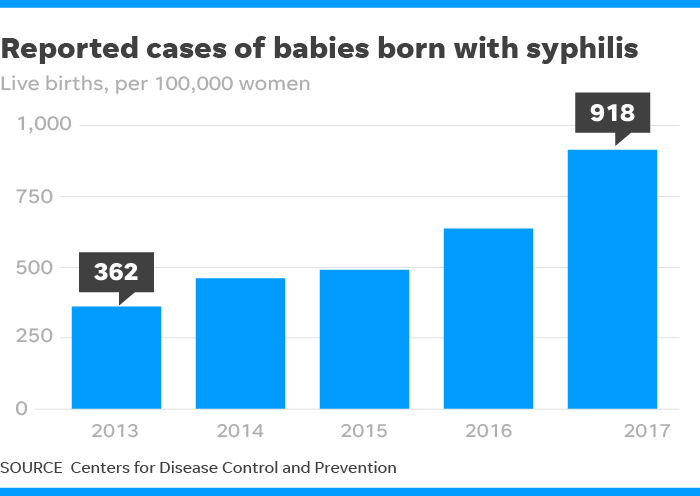Number of babies born with syphilis has more than doubled since 2013
 Ken Alltucker
Ken Alltucker
The number of babies born with syphilis has more than doubled since 2013, according to the Centers for Disease Control and Prevention, a trend that medical professionals said shows the need to be vigilant about testing and treating the rare but potentially disease.
The number of babies born with syphilis rose from 362 in 2013 to 918 in 2017, the CDC reported Tuesday. The greatest number of cases were in the South and West.
Syphilis is a bacterial infection that is easily cured with penicillin. But women with untreated syphilis can pass it on to their fetuses during pregnancy or to their babies during birth.
If transmitted, it can cause miscarriage, stillbirth or newborn death. Syphilis caused 77 stillbirths or newborn deaths in 2017, the CDC reported.
For babies who survive, it can lead to an assortment of physical and mental health problems.
More:Sexually transmitted diseases surge for the 4th straight year, CDC reports
More:Washing hands and other ways to protect newborns from deadly herpes virus
David Harvey, executive director of the National Coalition of STD Directors, called the surge "a systemic failure."
"We are failing pregnant women in the United States," he said. "We are seeing almost 1,000 babies born with syphilis that can easily be prevented."
The United States has made HIV transmission from mothers to newborns extremely rare, in part through the federal Ryan White Part D program, which funds community programs that provide care to pregnant women with HIV.
Harvey's organization wants a similar program to prevent the mother-to-newborn transmission of syphilis. Harvey said pregnant women should be tested for syphilis as early as possible and later in their pregnancies.
According to the CDC, mothers of one in three babies born with syphilis in 2016 were tested during pregnancy. But they were either infected after getting tested, or they were not treated in time to prevent passing the infection to the baby.
Thirty-seven states reported cases in 2017. Louisiana ranked first with 93.4 cases for every 100,000 births.
"We're not proud of these numbers," said Dr. Rebekah Gee, secretary of the Louisiana Department of Health. "Every case of syphilis should be preventable."
Gee said Louisiana has worked to reduce the number of new cases.
The state examines every case of newborn syphilis to lean steps that could prevent future cases, she said. One trend they discovered was moms who initially tested negative for the infection or were treated in their first trimesters contracted syphilis during later stages of pregnancy.
Louisiana requires doctors test pregnant women for both syphilis and HIV in the first and third trimesters.
The health department has also assigned case managers to Baton Rouge and Shreveport, the two regions with the highest number of cases. They work to raise awareness among doctors about the need to test.
Case managers and doctors also warn pregnant moms who have been tested or treated that they can contract the infection again, said DeAnn Gruber, the department's director of infectious diseases.
"Education is really important," Gruber said.

The Arizona health department's newly formed maternal morbidity review board identified congenital syphilis as a growing problem.
Arizona's 36 cases so far in 2018 already have surpassed last year's total, state health officials said. Six babies have died at or shortly after birth this year.
California had the most cases of congenital syphilis in the nation, and the third highest rate, according to the CDC.
One of the state's biggest challenges is reaching people who don't have access to prenatal care, said Heidi Bauer, chief of STD control for the California Department of Public Health.
Bauer said common barriers are poverty and unstable housing. Some moms are struggling with substance abuse, and may avoid drug testing or interaction with government agencies such as Child Protective Services.
California public health officials have attempted to reach out to at-risk people through needle exchanges and in prisons, Bauer said.
"Syphilis is one of those ancient diseases that tends to reemerge where people are largely marginalized," Bauer said.
Preliminary figures reported by the CDC last month showed new cases of the most common treatable sexually transmitted diseases – chlamydia, gonorrhea and syphilis – spiked nearly 10 percent in 2017 to an all-time high.
These infectious diseases have continued a four-year climb. Analysts cited changing sexual behavior and a lack of awareness.